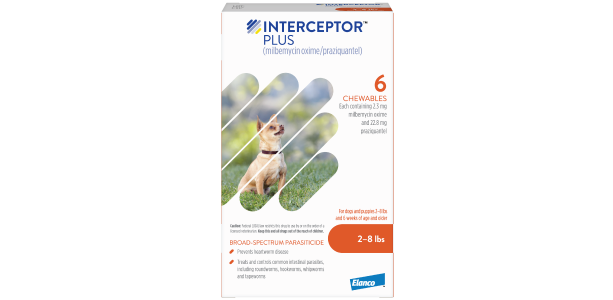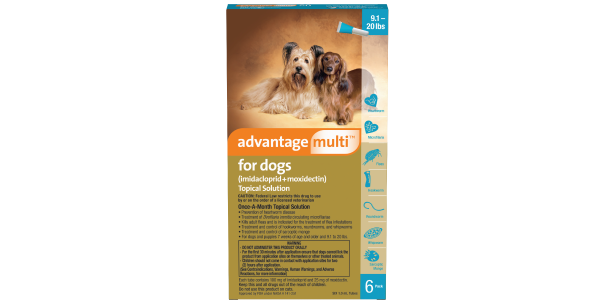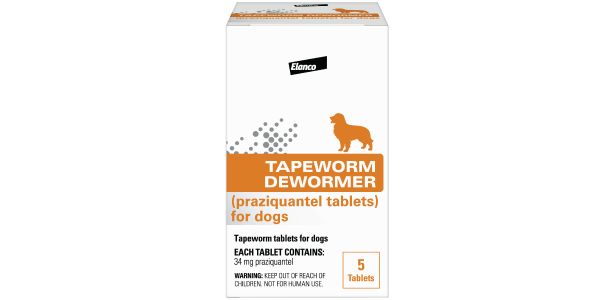What to know about worms and dogs.
Whether or not your dog has had worms in the past, you know that worms aren’t good news for your pet. Not only can they cause health problems in your dog — and puppies in particular —some could even pass diseases to you and your family.
In the end, it pays to be well-informed about pests that could potentially harm your dog. Below, we answer five common questions vets receive from dog owners about worms, along with expert answers.
1. Which Worms Should I Worry About?
Roundworm, tapeworm, hookworm, whipworm and heartworm are the primary culprits in dogs, though this can vary depending on the area where you live. Your pet’s lifestyle will often dictate which parasites pose the greatest risk. For instance, dogs that spend a lot of time outdoors can be at greater risk for getting worms.
2. How Do I Know If My Dog Has Worms?
If your dog is fully grown, it’s not always obvious when they have worms, so you might not know for sure. Symptoms for intestinal worms are more obvious in puppies: They might vomit or have diarrhea, and may also have a pot-bellied appearance and a dull coat. However, almost all puppies are born with roundworms, so even those that appear healthy will usually have some worms inside them.
Heartworms are more often diagnosed in adult dogs. These are worms that actually live inside your dog's heart, causing coughing and exercise intolerance.
3. How Did My Dog Get Worms?
Dogs’ everyday curiosity, behavior and propensity to sample things with their mouths will always put them at risk for picking up worms. Digging in dirt, having fleas, eating soil or feces and chasing wildlife are all ways your pet dog can pick up intestinal worms. It’s very easy for dogs to be exposed to a range of parasites throughout their lives.
Dogs become infected with heartworms through the bite of a mosquito. In other words, anywhere there are mosquitoes, dogs are at risk of infection.
4. Why Is Deworming My Dog Important?
Deworming your pup of intestinal worms is important for two reasons. The first is to stop further discomfort or damage the worms may be causing. The second is to reduce the eggs being shed in feces; dogs that are infected with worms will disperse thousands of microscopic eggs out into the soil through their feces, which contaminates the environment and serves as a source of infection for other dogs.
The best defense against heartworm is to have your dog on a heartworm disease prevention product found at your vet’s office.
5. Can I Get Worms from My Dog?
Unfortunately, yes. Anytime dogs are infected and actively shedding eggs in their feces, they can pose a risk to people — especially children. This is why it’s important to pick up your dog’s waste, get in the habit of washing your hands and teach children to wash their hands and avoid putting their fingers in their mouths. Sandboxes, playgrounds and even some beaches can be high-risk areas.
Remember: Consult your vet to get more personalized information about your dog’s specific risk of worms. They will factor in your dog’s lifestyle and the region where you live, and can recommend a treatment plan or heartworm prevention plan tailored to your pet. If you suspect your dog has worms, schedule a visit to treat the infestation quickly — and get your dog back to optimal health.

Interceptor® Plus (milbemycin oxime/praziquantel)
A monthly chew that protects dogs and puppies 6 weeks or older and 2 pounds or greater against heartworm disease, adult hookworm, roundworm, tapeworm and whipworm infections.

Trifexis® (spinosad + milbemycin oxime)
A beef-flavored tablet that kills fleas and prevents flea infestations, prevents heartworm disease, and treats and controls adult hookworm, roundworm and whipworm infections.

Advantage Multi® for Dogs (imidacloprid + moxidectin)
WARNING: DO NOT ADMINISTER THIS PRODUCT ORALLY. For the first 30 minutes after application ensure that dogs cannot lick the product from application sites on themselves or other treated animals. Children should not come in contact with the application sites for two (2) hours after application. (See Contraindications, Warnings, Human Warnings, Dosage & Administration, and Adverse Reactions for more information.)

Drontal® Plus (praziquantel/pyrantel pamoate/febantel)
Drontal® Plus is a safe and effective way to treat and control the most common intestinal worms in dogs. Available with a veterinarian's prescription.

Quad Dewormer (praziquantel/pyrantel pamoate/febantel) for Dogs
Nonprescription broad-spectrum dewormer that is effective against tapeworms, roundworms, hookworms and whipworms. Not for human use. Keep out of reach of children.

Tapeworm Dewormer (praziquantel tablets) for Dogs
An easy and effective way to remove common tapeworms from dogs. Not for human use. Keep out of reach of children.
Interceptor® Plus (milbemycin oxime/praziquantel)
Indications:
Interceptor Plus prevents heartworm disease and treats and controls adult roundworm, hookworm, whipworm, and tapeworm infections in dogs and puppies 6 weeks or older and 2 pounds or greater.
Important Safety Information:
Treatment with fewer than 6 monthly doses after the last exposure to mosquitoes may not provide complete heartworm prevention. Prior to administration of Interceptor Plus, dogs should be tested for existing heartworm infections. The safety of Interceptor Plus has not been evaluated in dogs used for breeding or in lactating females. The following adverse reactions have been reported in dogs after administration of milbemycin oxime or praziquantel: vomiting, diarrhea, decreased activity, incoordination, weight loss, convulsions, weakness, and salivation. For complete safety information, please see Interceptor Plus product label or ask your veterinarian.
Trifexis® (spinosad + milbemycin oxime)
Indications:
Trifexis prevents heartworm disease. Trifexis kills fleas and prevents flea infestations, and treats and controls adult hookworm, roundworm and whipworm infections in dogs and puppies 8 weeks and older and 5 pounds or more.
Important Safety Information:
The use of ivermectin at higher than FDA-approved doses at the same time as Trifexis can result in serious side effects. Treatment with fewer than three monthly doses after the last exposure to mosquitoes may not provide complete heartworm prevention. Prior to administration of Trifexis, dogs should be tested for existing heartworm infection. Use with caution in breeding females. The safe use of Trifexis in breeding males has not been evaluated. Use with caution in dogs with pre-existing epilepsy. The most common adverse reactions reported are vomiting, decreased activity, itching, decreased appetite, and diarrhea. To ensure heartworm prevention, observe your dog for one hour after administration. If vomiting occurs within an hour of administration, redose with another full dose. Puppies less than 14 weeks of age may experience a higher rate of vomiting. For complete safety information, please see Trifexis product label or ask your veterinarian.
Advantage Multi® for Dogs (imidacloprid + moxidectin)
Indications:
Advantage Multi® for Dogs is a once-a-month topical solution for the prevention of heartworm disease, the treatment of circulating microfilariae, killing adult fleas, the treatment of flea infestations, the treatment and control of sarcoptic mange, and the treatment and control of hookworm, roundworms and whipworms infections in dogs and puppies that are at least 7 weeks of age and that weigh at least 3 lbs.
Important Safety Information:
CAUTION: Federal law restricts Advantage Multi® for dogs to use by or on the order of a licensed veterinarian.
WARNING: DO NOT ADMINISTER THIS PRODUCT ORALLY. For the first 30 minutes after application ensure that dogs cannot lick the product from application sites on themselves or other treated animals. Children should not come in contact with the application sites for two (2) hours after application. (See Contraindications, Warnings, Human Warnings, Dosage & Administration, and Adverse Reactions for more information.) CONTRAINDICATIONS: Do not use this product on cats.
Drontal® Plus (praziquantel/pyrantel pamoate/febantel) for Dogs
Indications:
Drontal Plus: This drug is indicated for removal of Tapeworms (Dipylidium caninum, Taenia pisiformis, Echinococcus granulosus, and removal and control of Echinococcus multilocularis). For removal of Hookworms (Ancylostoma caninum, Uncinaria stenocephala), Ascarids (Toxocara canis, Toxascaris leonina), and Whipworms (Trichuris vulpis) in dogs.
Important Safety Information:
Drontal Plus: CAUTION: Federal (U.S.A.) law restricts this drug to use by or on the order of a licensed veterinarian. DOSAGE: Not for use in puppies less than 3 weeks of age or weighing less than 2 lbs. CONTRAINDICATIONS: Do not use in pregnant animals. WARNING: Keep out of reach of children. For full safety information, see product label for tablets or product label for taste tabs.
Quad Dewormer (praziquantel/pyrantel pamoate/febantel) Chewable Tablets for Dogs
USES:
Quad Dewormer (praziquantel/pyrantel pamoate/febantel) Chewable Tablets for Dogs will remove common tapeworms (Diplydium caninum and Taenia pisiformis), remove common hookworms (Anclostoma caninum, Unicaria stenocephala), remove common roundworms (Toxocara canis and Toxascaris leonine) and remove whipworms in dogs (Trichuris vulpis).
Important Safety Information:
Consult your veterinarian for assistance in the diagnosis, treatment and control of parasitism; consult your veterinarian before administering the tablets to weak or debilitated animals; do not deworm a dog or puppy that is sick; consult your veterinarian for diagnosis of the illness and appropriate care. Not for use in puppies that are younger than 3 weeks of age or dogs weighing less than 2 lbs. May be given directly in the mouth or offered in a small amount of food. WARNING: Keep out of reach of children.
For complete directions for use and safety information see product label.
Tapeworm Dewormer (praziquantel tablets) for Dogs
USES:
TAPEWORM DEWORMER (praziquantel tablets) FOR DOGS will remove the common tapeworms, Dipylidium caninum and Taenia pisiformis, from dogs and puppies.
Important Safety Information:
WARNING: Keep out of reach of children. Not for human use.
Not intended for use in puppies less than four (4) weeks of age. For complete directions for use and safety information see product label.